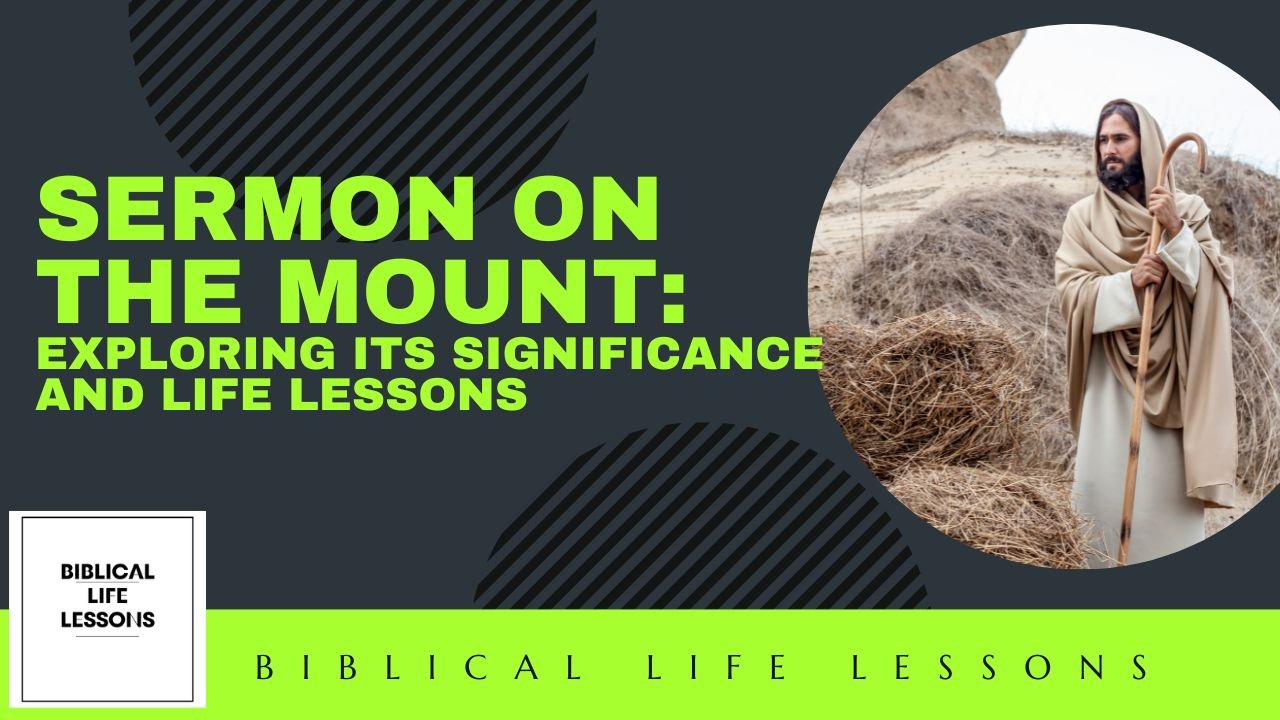The Sermon on the Mount, a remarkable discourse found in the book of Matthew, has long been recognized as one of the most significant teachings of Jesus Christ. In Matthew 5, we find this iconic sermon, which is revered not only for its spiritual depth but also for the profound life lessons it imparts. This article delves into the Sermon on the Mount, its historical and biblical context, and the valuable lessons we can draw from it.
The Setting and Context
Before we embark on understanding the sermon itself, it’s essential to grasp the historical and contextual backdrop against which this pivotal teaching took place. Jesus, in the early stages of His ministry, was gaining recognition and drawing crowds. His disciples and multitudes from various regions gathered to hear Him, and the Sermon on the Mount serves as a comprehensive guide to living a life in accordance with God’s principles.
The Sermon on the Mount consists of Matthew chapters 5, 6, and 7 and opens with what is commonly known as the “Beatitudes.” It covers a wide range of topics, including ethics, morality, spirituality, and conduct, making it a profound guide to Christian living.
1. The Beatitudes: Lessons in Spirituality and Humility
The Sermon on the Mount commences with the “Beatitudes,” a series of blessings pronounced by Jesus. The term “beatitude” stems from the Latin word for “blessed” or “happy,” and these statements elucidate the qualities and attitudes that lead to divine favor and true happiness.
Among the lessons we derive from the Beatitudes are:
- Blessed Are the Poor in Spirit: Acknowledging our spiritual poverty and dependence on God fosters humility and receptivity to His grace.
- Blessed Are Those Who Mourn: Compassion, empathy, and mourning for the suffering in the world exemplify the heart of Christ.
- Blessed Are the Meek: Meekness is not weakness but a humble and gentle spirit, which brings about peace and inheritance in God’s kingdom.
- Blessed Are Those Who Hunger and Thirst for Righteousness: Craving righteousness involves seeking justice and moral uprightness, which aligns with God’s heart.
- Blessed Are the Merciful: Acts of mercy reflect the mercy God bestows upon us and demonstrate a Christlike character.
- Blessed Are the Pure in Heart: A pure heart signifies sincerity and authenticity in our faith, drawing us nearer to God.
- Blessed Are the Peacemakers: Initiating peace and reconciliation mirrors God’s work and establishes us as His children.
- Blessed Are Those Who Are Persecuted for Righteousness’ Sake: Enduring persecution for our faith connects us with the legacy of the prophets.
These “Beatitudes” embody essential spiritual qualities that lead to a blessed and fulfilled life. They emphasize the importance of humility, compassion, righteousness, and peacemaking, urging us to live out these values.
2. The Salt of the Earth and the Light of the World
Continuing in Matthew 5, Jesus refers to His followers as the “salt of the earth” and the “light of the world.” These metaphors convey that Christians have a transformative and illuminating role in the world. Here, we find a crucial lesson about our influence on society and the responsibility to exhibit Christlike qualities.
3. Anger and Reconciliation
The sermon delves into the consequences of anger, urging reconciliation and resolution of conflicts. Jesus emphasizes the importance of addressing conflicts promptly and settling disputes with a reconciliatory heart. This teaching emphasizes the value of forgiveness and peaceful relationships.
4. Love Your Enemies
One of the most challenging aspects of the Sermon on the Mount is the call to love our enemies. Jesus calls us to transcend our natural inclinations and exhibit love and forgiveness even to those who oppose us. This lesson epitomizes the depth of Christ’s teachings and reflects God’s unwavering love for all.
5. Seek First the Kingdom of God
In Matthew 6, Jesus instructs His followers to prioritize the kingdom of God and His righteousness above all else. This powerful lesson encourages us to place our faith in God, recognize His provision, and not be consumed by worldly anxieties.
6. Judging Others and the Golden Rule
Matthew 7 includes lessons on avoiding judgment and practicing the “Golden Rule.” We are admonished not to judge others harshly and to treat others as we would like to be treated. These principles promote humility, empathy, and respect for our fellow human beings.
Conclusion: Lessons for Life
The Sermon on the Mount is an unparalleled source of life lessons, ethical guidance, and spiritual wisdom. It challenges us to live with humility, love, compassion, and righteousness. By following these teachings, we can strive to be the “salt of the earth” and the “light of the world,” positively influencing the world around us. The Sermon on the Mount serves as an enduring testament to the transformative power of Christ’s message and the profound impact it has on the lives of believers.











